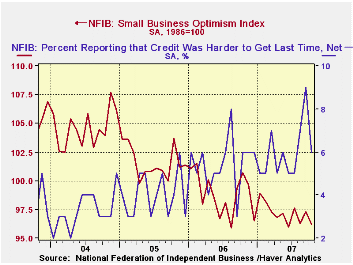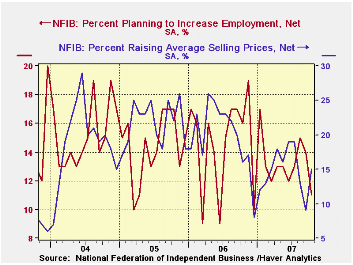 Global| Nov 13 2007
Global| Nov 13 2007Small Business Optimism Held Low, Credit Problems Eased
by:Tom Moeller
|in:Economy in Brief
Summary
Small business optimism rose by 1.1% last month and reversed all of its September increase. Nevertheless, the level remained near the lows of this past Summer, according to the National Federation of Independent Business (NFIB). [...]

Small business optimism rose by 1.1% last month and reversed all of its September increase. Nevertheless, the level remained near the lows of this past Summer, according to the National Federation of Independent Business (NFIB).
During the last ten years there has been a 70% correlation between the level of the NFIB index and the two quarter change in real GDP.
The percentage of firms indicating that credit was more difficult to get reversed all of the September increase, though it remained in an uptrend.
Respondents expecting the economy to improve fell and remained in
the low range of the last year. During the last ten years there has
been a 72% correlation between the NFIB percentage and the y/y change
in nonfarm payrolls.
The percent planning to raise capital expenditures fell to near the lows of this cycle and the percentage planning to raise employment fell sharply m/m to the lowest level since last December.
The percentage of firms indicating that inventories were too low fell to the current cycle's low..The percentage of firms planning to raise average selling prices remained low as did the percentage of firms actually raising prices, though the latter rose m/m. During the last ten years there has been a 60% correlation between the change in the producer price index and the level of the NFIB price index.
About 24 million businesses exist in the United States. Small business creates 80% of all new jobs in America.
| Nat'l Federation of Independent Business | October | September | Y/Y | 2006 | 2005 | 2004 |
|---|---|---|---|---|---|---|
| Small Business Optimism Index (1986=100) | 96.2 | 97.3 | -4.5% | 98.9 | 101.6 | 104.6 |
Tom Moeller
AuthorMore in Author Profile »Prior to joining Haver Analytics in 2000, Mr. Moeller worked as the Economist at Chancellor Capital Management from 1985 to 1999. There, he developed comprehensive economic forecasts and interpreted economic data for equity and fixed income portfolio managers. Also at Chancellor, Mr. Moeller worked as an equity analyst and was responsible for researching and rating companies in the economically sensitive automobile and housing industries for investment in Chancellor’s equity portfolio. Prior to joining Chancellor, Mr. Moeller was an Economist at Citibank from 1979 to 1984. He also analyzed pricing behavior in the metals industry for the Council on Wage and Price Stability in Washington, D.C. In 1999, Mr. Moeller received the award for most accurate forecast from the Forecasters' Club of New York. From 1990 to 1992 he was President of the New York Association for Business Economists. Mr. Moeller earned an M.B.A. in Finance from Fordham University, where he graduated in 1987. He holds a Bachelor of Arts in Economics from George Washington University.






